
A Restart
11-29-2020Weekly Reflection© J. S. Paluch CompanyWith Advent we begin a new church year as we renew our preparations for the coming of Christ. The scriptures show a profound movement from despair in the first reading, as we feel the wrath of God's anger and a sense of being abandoned, to the responsorial psalm, which begs us to turn toward God, and the second reading where we see a glimmer of hope. Brimstone returns in the Gospel.
READ MORE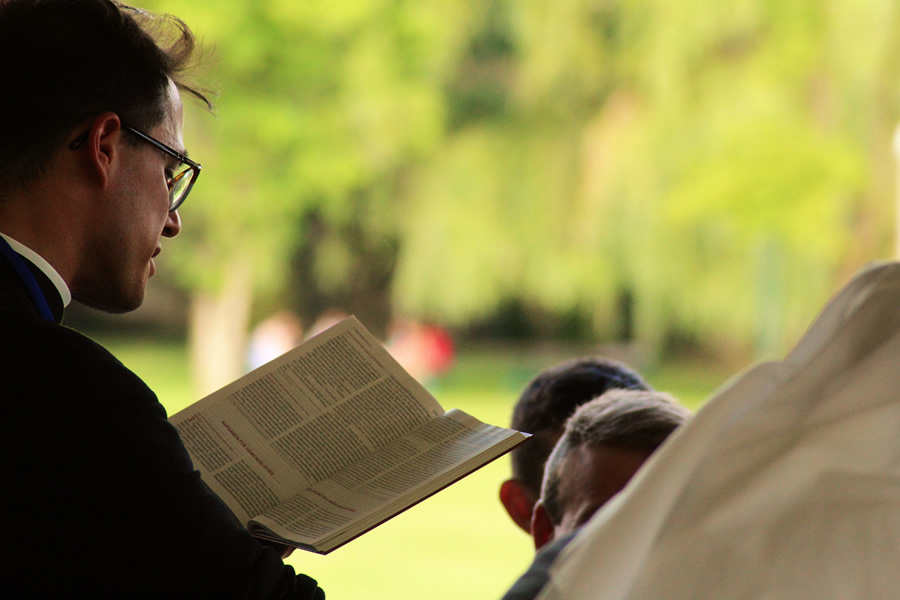
Sabbatical
11-22-2020Weekly ReflectionFr. Will SchmidDear San Francisco de Asis Parishioners,
For the past couple of years I have been spiritually moved by the Companions of Christ, a community of diocesan priests in Denver, Colorado who are committed to a common life of prayer, fraternity, and a rule of life inspired by the evangelical counsels of obedience, chastity, and poverty. After consultation with Bishop Olmsted and other priests and seminarians from the diocese, we believe there is a potential calling from the Lord to establish a community like the Companions of Christ within the Diocese of Phoenix, and the bishop has given me his blessing to take a sabbatical (from January through May of 2021) to live with the Companions of Christ in Denver, so as to experience their way of life and further discern the possibility of establishing a similar community within the diocese. In addition, while living with the Companions of Christ, I have been invited by St. John Vianney Seminary to assist with the spiritual formation of seminarians for the spring semester.
READ MORE
The Servant King
11-19-2020Weekly Reflection© J. S. Paluch CompanyAs we celebrate the solemnity of Our Lord Jesus Christ, King of the Universe, many of the traditional hymns and images for the day are joyful and triumphal. For some, these connotations may be perceived as negative. In these days when there are strong divisions within the Church, and when some government leaders are so far away from the people, we need to hear all of today's scriptures, and draw a bigger, fuller picture of Christ as servant king. In Ezekiel, we see God as both the tender, loving shepherd and the one who will judge at the Second Coming. This ties in with Matthew's Gospel and separation of sheep and goats and "whatsoever you do." We pray Psalm 23 with great familiarity and hope. First Corinthians carefully explains to us the order in which all will happen. This is not an evil dictatorship, or a power-hungry leader, but the culmination of a plan that was carefully laid out in love.
READ MORE
The Rest of the Story
11-15-2020Weekly Reflection© J. S. Paluch CompanyPaul Harvey was a popular radio broadcaster with a daily program during which he would relate a historical anecdote, but it would have a twist at the end, and then he would intone "and now you know the rest of the story." Our scriptures today are like that. We await the coming Christ as the readings describe for us how to be good servants, but they give us a limited picture. The famous Proverbs passage, "The Valiant Wife" is edited down from the full selection (31: 10-31) to just a few verses. Take a couple moments to explore the fuller selection. Psalm 128 proclaims, "Blessed are those who fear the Lord," but in this context "fear" doesn't mean dread and trepidation. Rather, this kind of fear means "to show awe" and there are wonderful promises made to those who do. The letter to the Thessalonians continues the call to be alert, and Matthew shows us various ways that people might respond to God in the parable of the talents. The Gospel is presented in long and shortened versions, be sure to read the whole thing so you can get "the rest of the story."
READ MORE
Congratulations to SFdA’s newest Deacon, Deacon Greg Blanchard
11-08-2020Weekly ReflectionDcn. Gregory BlanchardI was born and raised in the Southwest and lived in Oklahoma, Texas, California,and Arizona by the time I was in fourth grade. I grew up in a Catholichome where my parents lived their faith simply and steadfastly. I am thethird of four children where my sister is the oldest and I am the middle ofthree boys. I definitely experienced my family as the first school of lovejust as the Church documents teach.
READ MORE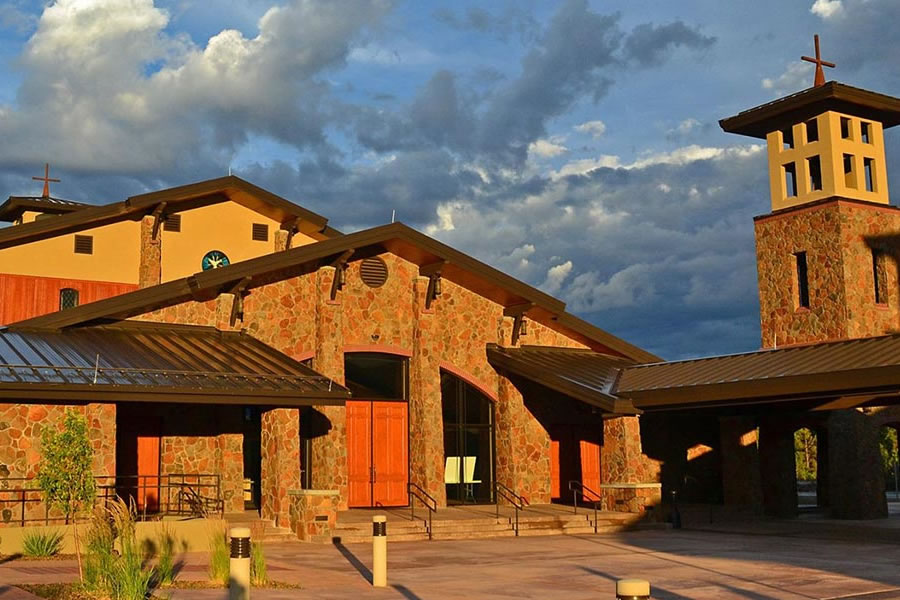
Adjusting procedures as weather cools off
11-02-2020Weekly ReflectionFr. Will SchmidDear Parishioners,
As time moves on and restrictions implemented to mitigate the spread of the COVID-19 virus are still in place, we find ourselves in a dilemma. While it is advantageous to keep the church doors, windows, and air intake system open during Mass to allow for increased ventilation, the colder weather, wind, and upcoming snow will make it more difficult to maintain the church temperature at a healthy level.
READ MORE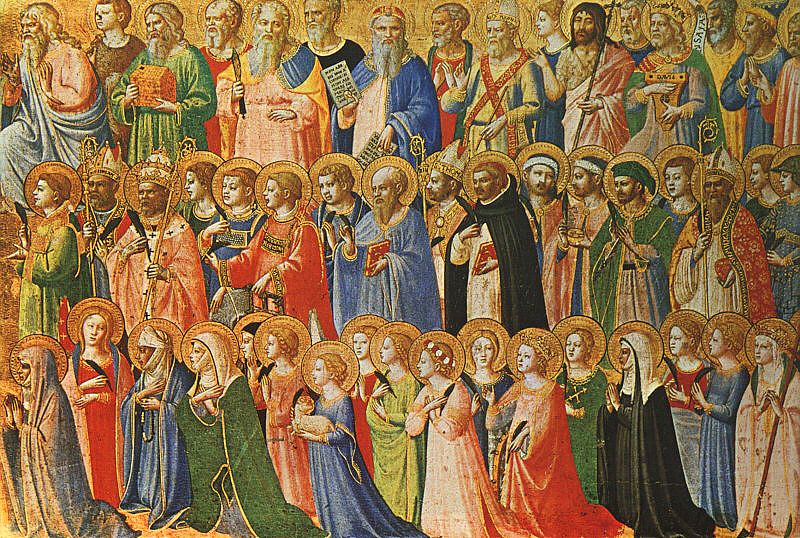
Family Reunion
11-01-2020Weekly Reflection© J. S. Paluch CompanyToday we celebrate a glorious family reunion, the solemn feast that gives us a glimpse of all our brothers and sisters in Christ who have gone home to God before us. When we quiet ourselves to hear the Word of God today, we recall the mystery of our salvation. We praise the Lord who saves our loved ones who have died and who promises to have mercy on us as well. The reading from Revelation amazes us with its sweeping images of countless souls basking in God's glory. The Responsorial Psalm echoes our own longing to join those saints and look on the face of God. Saint John's letter affirms our deep desire to be with God, providing robust advice about how we may realize our hope: by living purely. The familiar words of Matthew's Beatitudes show the way to purity - and to genuine happiness, now and forever.
READ MORE
The Great Commandments
10-25-2020Weekly Reflection© J. S. Paluch CompanyLove your neighbor. It sounds so simple. Yet it is not always east to accomplish. Many things get in the way of taking this commandment to heart. Sometimes, it is things that get in the way, but more often, we get in the way. We tend to see things through our own perspective, rather than considering the other person's point of view. In our interactions with others, we often fail to truly listen, focusing instead on our next response or point to be made. We say we love our neighbor, right up to the point at which doing so requires some sacrifice of time, attention, or financial support, and then suddenly, a thousand reasons for keeping to ourselves emerge. Jesus knew this when he summed up the greatest commandments of loving God and neighbor. Notice when he said about this: "You shall love your neighbor as yourself."
READ MORE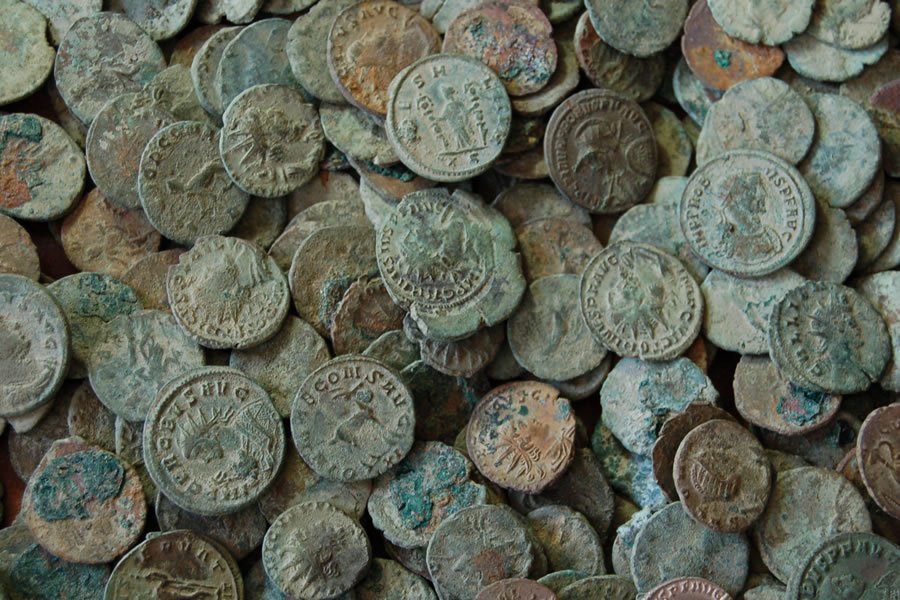
The Trap
10-18-2020Weekly Reflection© J. S. Paluch CompanyIt is a scene that could be taken from the daily news feed. A young upstart is confronted by two established leaders. While holding opposing views on many issues, the two band together in an attempt to trap the newcomer. This is not a start from the daily news, however. The newcomer is Jesus in today's Gospel passage. The two established leaders, one a Pharisee and the other a Herodian, think they can trap Jesus by posing a question about the payment of taxes. No matter how he might respond to their questions, they would have the means to discredit him. Jesus sees through their hypocrisy and does not fall into their trap. His response gets at the hears of what is truly important: "Then repay to Caesar what belongs to Caesar and to God what belongs to God."
READ MORE
God's Promises
10-11-2020Weekly Reflection© J. S. Paluch CompanyOur readings this week speak of God's promises and their fulfillment, all in different ways. Isaiah presents a feast set in the future and hosted by God. Here the participants witness the astonishing generosity of God. At the feast, God gives the ultimate gift, the destruction of death itself. Saint Paul, confident in the fulfillment of God's abundant promises, urges the Philippians to live in gratitude and patience. Today's Gospel, however, is more challenging for us to hear. While announcing God's generous invitation, Jesus also describes, in dramatic imagery, how people may reject the invitation. Matthew reminded the early church of the need to recognize God's summons and be prepared to participate fully in God's banquet. This complex and unsettling parable invites our reflection on the nature of God's invitation and our response.
READ MORE
Vineyards
10-01-2020Weekly Reflection© J. S. Paluch CompanyVineyards were an essential part of the economy of Israel during the times of Isaiah and Jesus. Vineyard owners had the difficult challenge of producing a rich harvest. Our readings from Isaiah and Matthew describe God and God's creation in terms of the business of vineyards. The two stories are closely linked, as Jesus borrowed and adapted his parable from Isaiah. Using this rich imagery, we can see the vineyard as all the places of God's creation and ongoing work.
READ MORE
The anti-Gospel of the world
09-03-2020Weekly ReflectionFr. Will SchmidDear Brothers and Sisters,
Let me read to you a different kind of Gospel than the one we heard a moment ago.
A reading from the anti-Gospel according to social media. Glory to me and my ego.
If your brother, or some other random person with whom you have no relationship, says or does something you find disagreeable, especially concerning politics, do not reach out to them individually and attempt to seek the full context behind their words or actions. There is no need to seek a deeper understanding behind what they said or did. After all, this is what the silly Christians do.
READ MORE
Live-streamed Masses
07-17-2020Weekly ReflectionFr. Will SchmidDear Parishioners of San Francisco de Asis,
Recently, we installed a brand new HD camera in the Church and we are now live-streaming all of our Masses for those who are unable to attend. You can access the live-stream on Facebook and YouTube. We hope you enjoy the enhanced quality of this new camera. Please remember that no technology is perfect and there are bound to be small audio and visual anomalies from time to time. We will be making small, fine tuned adjustments on an ongoing basis to improve our broadcast of Mass at SFDA.

Face Coverings Required for Mass Attendees
06-20-2020Weekly ReflectionFr. Will SchmidDear Parishioners of San Francisco de Asis,
After reviewing Mayor Coral Evans’ recent proclamation concerning face coverings in public, and after consultation with Bishop Olmsted and other members of leadership in the Diocese of Phoenix, beginning Sunday, June 21, San Francisco de Asís Catholic Church will be requiring all Mass attendees five years of age and older (who do not have a medical condition, mental health condition, developmental disability, or is unable to remove the face covering without assistance) to wear face coverings during Mass with the exception of the moment when they approach to receive Holy Communion.
READ MORE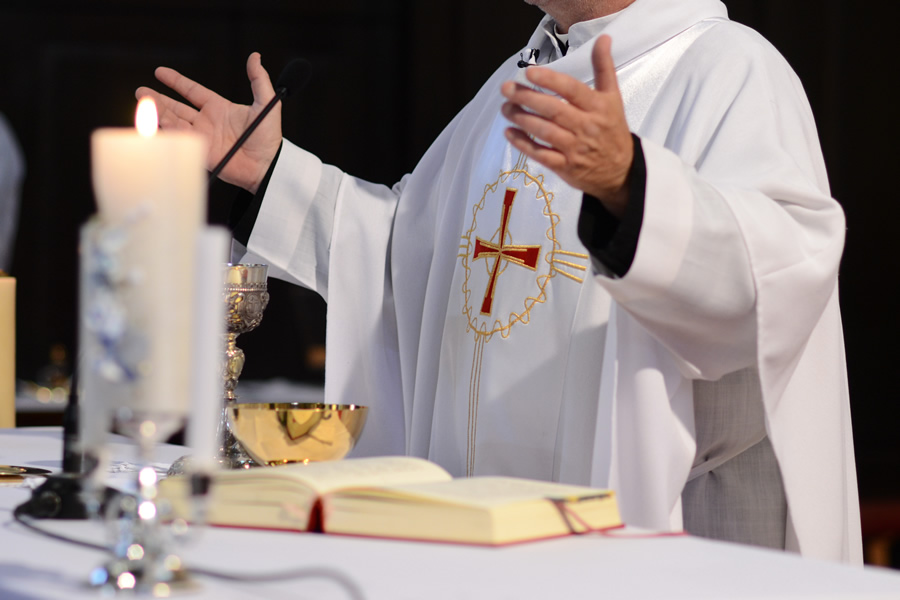
Public Celebration of Mass Resumes
05-13-2020Weekly ReflectionFr. Will SchmidDear Brothers and Sisters in Christ,
It is with great joy that I announce to you that we have finalized a plan to resume public Masses at San Francisco de Asis Catholic Church. Please take a few moments to carefully read through the following questions and answers.
When will Masses be celebrated?
Beginning May 16 & 17, we will resume our normal weekend Mass schedule: Saturday evening English Vigil Mass at 4:30pm, Sunday morning English Masses at 8:00am and 10:00am, and Sunday afternoon Spanish Mass at 12:15pm.
READ MORE
SFdA Parish Updates
05-07-2020Weekly ReflectionFr. Will SchmidWe are happy to announce that we will be distributing Holy Communion after the Sunday Facebook Live Masses at SFdA Church! Please note the changes that will begin this week.
Sunday Mass in English will begin at 10:00am starting May 10. Spanish Mass will still begin at 12:15pm.
Holy Communion will be distributed after the English Facebook live Mass until 11:45am and after the Spanish Facebook live Mass until 1:45pm.
The Adoration Chapel will be closed every Sunday from 9:00am-1:00pm.
READ MORE